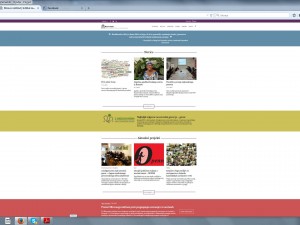Call for Papers

Peace institute is organizing international, interdisciplinary conference titled Changing Social Organization of Care and its Implications for Social Politics. It will be held from 13th to 14th May 2010 in Ljubljana, Slovenia.
Europe is experiencing a revival of paid domestic and care work in private homes in the areas of child care, elderly care and household maintenance. Theory and research point to the combination of socio-economic, demographic and welfare causes as characteristics of post industrial societies, which give rise to the care deficit. These characteristics are: changes in demographic structure of population; changes in family structures and dynamics, individualization and instability of life and family courses; feminization of labour force and masculinization of women’s employment patterns; intensification, flexibilization and precarization of working conditions in paid employment; global and local economic inequalities that foster female migration and employment in insecure work, and persisting gender inequality in sharing domestic and care work. Policy responses to these developments are slow: they are either absent (lack of increase in provision of public care services; deregulation, privatization and refamilization of care; lack of integration policies) or inadequate (cash for care allowances, insufficient work/life balance arrangements, introduction of quotas on migrant care workers), which forces (mainly) women to seek for individual solutions in the grey economy of insecure care services.
The irregular paid domestic and care workers, regardless of whether they are migrant or local women, with their activity in the domestic sphere reorganize the notions of welfare and the relationship between care and paid work in European societies. Most of this kind of work suffers from “invisibility”; moving, as it does, through informal networks of family, kin, friends or acquaintances, and operating without formal contracts specifying wages, hours of work and working conditions etc., often in hiding from the state due to illegality. On the supply side, this type of (mainly) women’s irregular work, low paid and flexible work, carried out in informal circumstances in the private sphere, falls upon those with the least options, lowest educational levels, and those who have limited rights of citizenship: (undocumented) immigrants, older women, long-term unemployed women, young women seeking their first job, single mothers, working poor. On the demand side, it is noteworthy that the employment of an informal paid care worker is a crucial question of class, and that it is a coping strategy of mainly working women of high socioeconomic level. This raises the question of crucial dependence of the provision of care in European societies on social exclusion, poverty, migration, and class, gender and ethnic inequalities.
The purpose of the conference is to provide an international and cross-disciplinary space to explore this question. We are particularly interested in papers and panels that address the following issues:
– Theoretization of care, social organization of care and (global) political economy of care
– Care from perspectives of social justice, social equality and social inclusion
– Social inequalities, poverty and “local” care chains
– Migration and global care chains
– Intersections of class, race/ethnicity and gender in formal and informal care sector
– Work ethic and care ethic
– Citizenship and care
– Demographic decline and care deficit
– Gender inequalities, women’s employment and care deficit
– Changing family patterns and care deficit
To apply, please send individual paper proposals (max. 250 words) or proposals for panels (max. 350 words) of three or four related papers, a short CV, your institutional affiliation and contact to ziva.humer@guest.arnes.si. Deadline for the submission of abstracts is 15 December 2009; acceptance of papers will be announced on 15 January 2010; written papers should be submitted by 10 April 2010. Call can be found on www.mirovni-institut.si.
We are looking for the possibilities of funding accommodation for participants within the East East: Partnership Beyond Borders Program. We especially encourage participants from Eastern Europe to apply and for whom we’ll be able to fund travel and accomodation costs.
We are planning to publish selected papers presented at the conference.
The conference Changing social organization of care and its implications for social politics is part of the project Informal Reproductive Work: Trends in Slovenia and EU, financed by the Slovenian Research Agency. For any additional information concerning the conference do not hesitate to contact:
Majda Hrženjak or Živa Humer.

